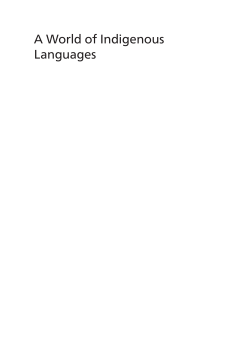
BOOK
A World of Indigenous Languages
Teresa L. McCarty | Sheilah E. Nicholas | Gillian Wigglesworth
(2019)
Additional Information
Book Details
Abstract
Spanning Indigenous settings in Africa, the Americas, Aotearoa/New Zealand, Australia, Central Asia and the Nordic countries, this book examines the multifaceted language reclamation work underway by Indigenous peoples throughout the world. Exploring political, historical, ideological, and pedagogical issues, the book foregrounds the decolonizing aims of contemporary Indigenous language movements inside and outside of schools. Many authors explore language reclamation in their own communities. Together, the authors call for expanded discourses on language planning and policy that embrace Indigenous ways of knowing and forefront grassroots language reclamation efforts as a force for Indigenous sovereignty, social justice, and self-determination. This volume will be of interest to scholars, educators and students in applied linguistics, Ethnic/Indigenous Studies, education, second language acquisition, and comparative-international education, and to a broader audience of language educators, revitalizers and policymakers.
This work is a remarkable source of inspiration and encouragement to anyone engaged in Indigenous language reclamation efforts, showing ways to tackle some of the most challenging problems in this context. The book ought to be disseminated through university libraries, community centers and other spaces where Indigenous community members, activists, scholars and others can access it easily.
This collection of international voices and perspectives – speaking about and in Māori, Ojibwe, Aanaar Saami, Hopi, Limbu, Ngaanyatjarra, Quechua, and Nahuatl, among others – powerfully works for the reclamation of Indigenous languages and the resilience of Indigenous peoples. The authors and editors provide transformative visions of Indigenous futures for Indigenous languages.
It is utterly refreshing to read a book exclusively dedicated to Indigenous world languages with each chapter written or co-written by an Indigenous author. Equally invigorating is the authors' common value for and focus on language reclamation movements as they are situated in policies and politics, pedagogy, and Indigenous futures.
Teresa L. McCarty is G.F. Kneller Chair in Education and Anthropology and Faculty in American Indian Studies, University of California, Los Angeles, USA. Her research focuses on Indigenous education, language planning and policy, language revitalization/reclamation, critical ethnography, and educational and linguistic anthropology.
Sheilah E. Nicholas is a member of the Hopi Tribe and an Associate Professor in the Department of Teaching, Learning and Sociocultural Studies, and American Indian Studies, University of Arizona, USA. Her research interests include Indigenous/Hopi language reclamation and maintenance, Indigenous language ideologies and epistemologies, the intersection of language, culture and identity, and Indigenous language teacher education.
Gillian Wigglesworth is Distinguished Professor of Linguistics and Applied Linguistics at the University of Melbourne, Australia and chief investigator in the ARC Centre of Excellence for the Dynamics of Language. Her research interests include the languages of Indigenous children growing up in remote communities in Australia, the complexity of their language ecology, and how these interact with English once they enter the formal school system.
Table of Contents
| Section Title | Page | Action | Price |
|---|---|---|---|
| DOI https://doi.org/10.21832/MCCART3064 | iv | ||
| Contents | vii | ||
| Contributors | ix | ||
| Acknowledgements | xv | ||
| Preface | xvii | ||
| A World of Indigenous Languages – Resurgence, Reclamation, Revitalization and Resilience | 1 | ||
| Part 1 Policies and Politics in Indigenous Language Reclamation | 27 | ||
| 1 Configuring Language(s) and Speakers: The History and Politics of an Aboriginal Ethnolinguistic Identity in the Yukon, Canada | 29 | ||
| 2 Language Policy in Post- Apartheid South Africa – An Evaluation | 48 | ||
| Part 2 Pedagogies and Processes in Indigenous Language Reclamation | 67 | ||
| 3 The Impact of ‘Culturalcy’ in Ngā Kura ā Iwi TribalSchools in Aotearoa/NZ: Mō Tātou, Mā Tātou, E AiKi a Tātou – For Us, By Us, Our Way | 69 | ||
| 4 Media and Technology: Revitalizing Latin American Indigenous Languages in Cyberspace | 91 | ||
| 5 Language Vitality In and Out of School in a Remote Indigenous Australian Context | 115 | ||
| 6 Task-Based Language Learning for Ojibwe: A Case Study of Two Intermediate Adult Language Learners | 134 | ||
| 7 Strengthening Indigenous Languages through Language Technology: The Case of Aanaar Saami in Finland | 153 | ||
| Part 3 Prospects and Possibilities for Indigenous Language Reclamation | 171 | ||
| 8 Without the Language, How Hopi Are You?: Hopi Cultural and Linguistic Identity Construction in Contemporary Linguistic Ecologies | 173 | ||
| 9 Transformation from the Bottom Up: Ideological Analysis with Indigenous Youth and Language Policy Justice in Nepal | 194 | ||
| 10 Language Key Holders for Mexicano: The Case of an Intergenerational Community in Coatepec de los Costales, Mexico | 214 | ||
| Author Index | 235 | ||
| Subject Index | 237 |
